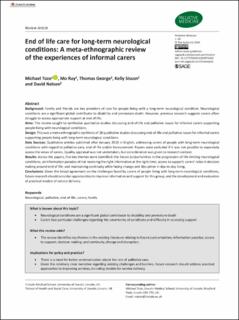| dc.contributor.author | Toze, Michael | |
| dc.contributor.author | Ray, Mo | |
| dc.contributor.author | George, Thomas | |
| dc.contributor.author | Sisson, Kelly | |
| dc.contributor.author | Nelson, David | |
| dc.date.accessioned | 2021-02-03T14:02:12Z | |
| dc.date.available | 2021-02-03T14:02:12Z | |
| dc.date.issued | 2020 | |
| dc.identifier.citation | Toze M, Ray M, George T, Sisson K, Nelson D. End of life care for long-term neurological conditions: A meta-ethnographic review of the experiences of informal carers. Palliative Medicine. November 2020. | en_US |
| dc.identifier.uri | https://hdl.handle.net/11250/2726026 | |
| dc.description.abstract | Background:
Family and friends are key providers of care for people living with a long-term neurological condition. Neurological conditions are a significant global contributor to disability and premature death. However, previous research suggests carers often struggle to access appropriate support at end of life.
Aims:
This review sought to synthesise qualitative studies discussing end-of-life and palliative issues for informal carers supporting people living with neurological conditions.
Design:
This was a meta-ethnographic synthesis of 38 qualitative studies discussing end-of-life and palliative issues for informal carers supporting people living with long-term neurological conditions.
Data Sources:
Qualitative articles published after January 2010 in English, addressing carers of people with long-term neurological conditions with regard to palliative care, end of life and/or bereavement. Papers were excluded if it was not possible to separately assess the views of carers. Quality appraisal was not undertaken, but consideration was given to research context.
Results:
Across the papers, five key themes were identified: the future (un)certainties in the progression of life-limiting neurological conditions; an information paradox of not receiving the right information at the right time; access to support; carers’ roles in decision making around end of life; and maintaining continuity while facing change and disruption in day-to-day living.
Conclusions:
Given the broad agreement on the challenges faced by carers of people living with long-term neurological conditions, future research should consider opportunities to improve information and support for this group, and the development and evaluation of practical models of service delivery. | en_US |
| dc.publisher | Palliative Medicine | en_US |
| dc.rights | Navngivelse 4.0 Internasjonal | * |
| dc.rights.uri | http://creativecommons.org/licenses/by/4.0/deed.no | * |
| dc.subject | neurological | en_US |
| dc.subject | palliative | en_US |
| dc.subject | end-of-life | en_US |
| dc.subject | carers | en_US |
| dc.subject | family | en_US |
| dc.title | End of life care for long-term neurological conditions: A meta-ethnographic review of the experiences of informal carers | en_US |
| dc.type | Journal article | en_US |
| dc.source.journal | Palliative Medicine | en_US |
| dc.identifier.doi | https://doi.org/10.1177%2F0269216320974262 | |

